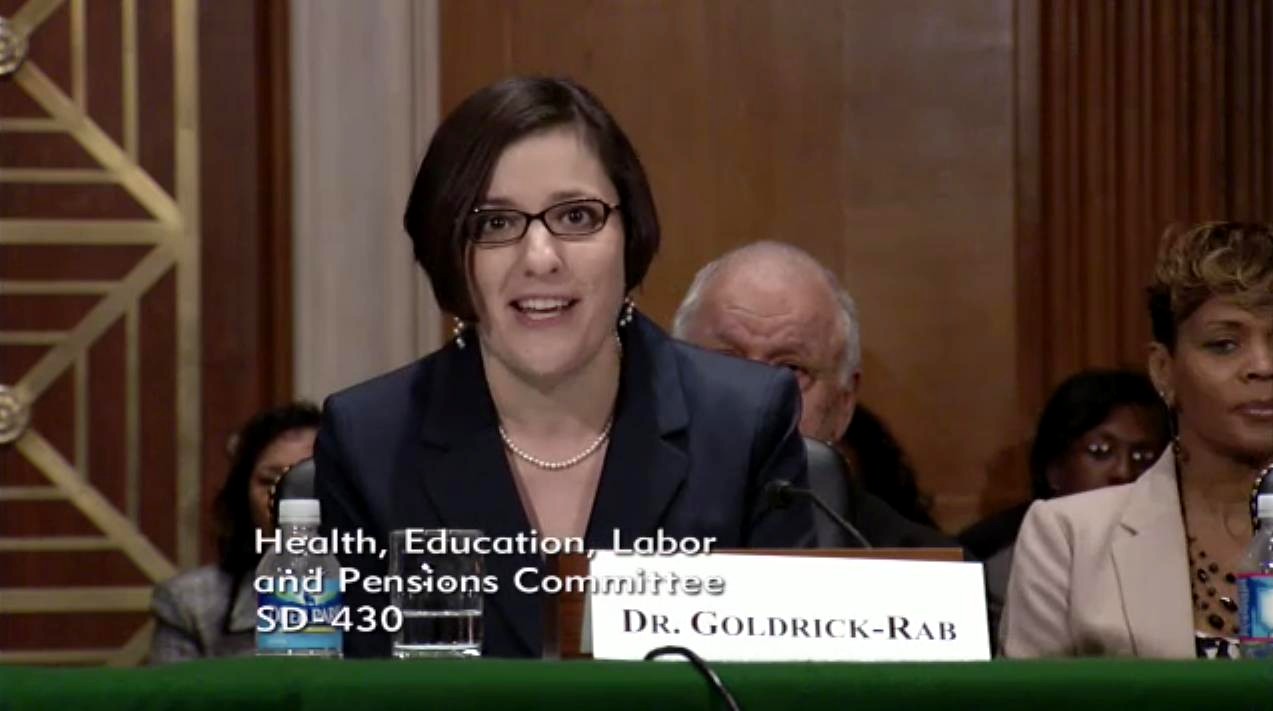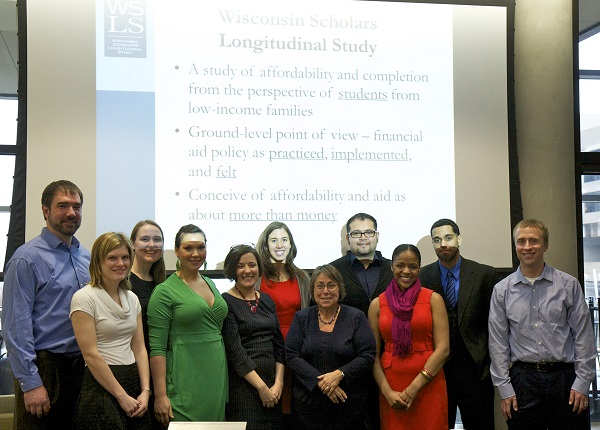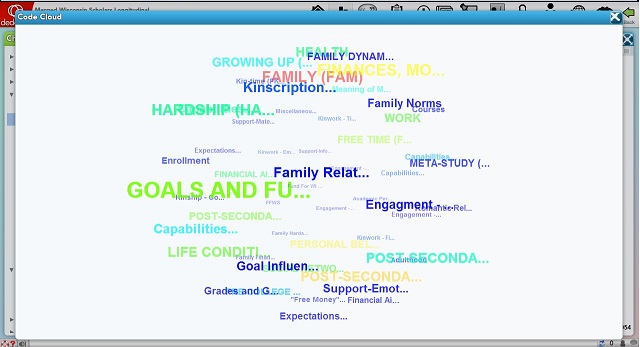
Article: Dedoose in the Field: Sociology and Education - Sara Goldrick-Rab
Tags
- All
- Training (4)
- Account Management and Security (9)
- Features of Dedoose (9)
- Dedoose Desktop App (1)
- Dedoose Upgrades and Updates (5)
- Dedoose News (6)
- Qualitative Methods and Data (11)
- Other (5)
- Media (5)
- Filtering (5)
- Descriptors (10)
- Analysis (22)
- Data Preparation and Management (20)
- Quantitative Methods and Data (5)
- Mixed Methods (20)
- Inter Rater Reliability (3)
- Codes (26)
- Tags:
- Dedoose News
4/26/2013
Studying the Impact of Private Financial Aid on College Persistence and Graduation
About Sara
 Sara testifies before the Senate HELP Committee
Sara testifies before the Senate HELP Committee
Dr. Sara Goldrick-Rab is an awesome Dedoose user who just testified before Congress last week about college affordability. This is the focus of her current research project which she’s working on with over 75 collaborators! Under the direction of Dr. Goldrick-Rab, this diverse team of researchers is using Dedoose to conduct a study on how different private, need-based financial aid packages affect persistence and graduation on the college level. We are so excited to meet them at next week’s AERA conference and to hear more about their awesome project in person!
Read on for our interview with the team!
Tell us a little bit about yourself and your team.
“The Wisconsin Scholars Longitudinal Study (WSLS) is directed by Dr. Sara Goldrick-Rab. Sara is a scholar-activist and sociologist with a deep commitment to bringing research into policy and practice. Her research explores policies aimed at reducing socioeconomic and racial inequalities, particularly the causes and consequences of inequality in post-secondary educational attainment.
Research within the WSLS is a team effort, involving more than 75 co-principal investigators, full-time employees, post-docs, graduate and undergraduate students since its inception in 2008. These researchers come from a variety of backgrounds including educational policy studies, economics, sociology, psychology, and social work.”
 A few members of the WSLS team with US Under Secretary of Education Dr. Martha Kanter
A few members of the WSLS team with US Under Secretary of Education Dr. Martha Kanter
What’s the purpose or focus of your project?
“The WSLS is the first statewide longitudinal study of the impact of private need-based financial aid on college persistence and graduation. Six foundations provide financial backing for the study, including the Bill and Melinda Gates Foundation, Great Lakes Higher Education Guaranty Corporation, Spencer Foundation, William T. Grant Foundation, and Wisconsin Alumni Research Foundation.
The study addresses four critical policy-relevant questions:
- What are the impacts of private grants on college persistence and graduation?
- How do the impacts vary according to the way in which the grant is distributed to students (reduced loans versus increased cash)?
- How do the impacts vary by student and college characteristics?
- How and why do the impacts arise?
These questions have direct implications for both governmental and private grant programs and provide an important basis for addressing current debates about the future of financial aid in the state and nationwide. This is why the WSLS has been prominently featured in discussion of financial aid at the local, state, and national levels.
WSLS researchers use multiple methods to examine the educational outcomes of 3,000 low-income undergraduates enrolled in one of the 42 public University of Wisconsin System and Wisconsin Technical College System colleges and universities. In 2008, 40% of those students were randomly assigned to receive a Fund for Wisconsin Scholars (FFWS) grant while the remainder were not. Researchers track the students using administrative data, student surveys, and in-depth interviews with a focal sub-sample to examine their outcomes and estimate experimental effects. In additional to those analyses, additional investigations into key moderators and mediators are also underway.
The WSLS has produced more than 25 working papers and conference presentations on a diverse array of topics related to the college experiences and outcomes of these students. These include studies of the impact of financial aid on academic outcomes, educational aspiration, work behaviors, and student engagement. Authors have also written about the multiple meanings of loan aversion among students from low-income families, how family relational contexts interact with financial resources to affect students’ educational success, and how students’ strategies for seeking help vary and influence their academic trajectories. The team has hosted two statewide conferences for policymakers, researchers, and practitioners, and work is disseminated regularly at both the local and national level.”
For more information on the study and to see forthcoming publications see: www.finaidstudy.org
How are you using Dedoose to meet your research needs?
“The WSLS is a complex project with multiple objectives and utilizing a very large amount of data. It also involves numerous analysts. Dedoose helps us achieve our goals by allowing us to work collaboratively and efficient to code interview data and then analyze it both cross-sectionally and longitudinally, and in conjunction with comprehensive survey data to illuminate patterns and trends. As a truly mixed-methods software program, it is flexible, allowing for some analysts to utilize a ground theory approach to analysis (e.g., coding the data for emergent themes and then circulating back through the data as codes develop) while others work deductively, coding qualitative data systematically and reliably into quantitative scales for purposes of triangulation. We are constantly discovering new ways of using Dedoose to address our research questions and planning future data collection accordingly.
Sara has begun to teach Dedoose to her students in a year-long mixed methods practicum, covering the theory and practice of mixed methods research in the social sciences. Using WSLS study data assembled in the Dedoose database, she has trained some twenty students in the application of this research program thus far.”
What is your favorite Dedoose Feature?
“The WSLS team most enjoys the unique data visualization features for which Dedoose is known. They use the code co-occurrence and bubble plot charts frequently, among others that to "quant the qual. " In addition, the team finds the incredible technical support provided by the Dedoose staff invaluable. The website includes a wealth of training videos and tutorials, updated regularly to meet the evolution of the software. Moreover, the software is evolving to meet the needs of the field, something that few other programs seem to do.”
Speaking of data visualization, check out this snapshot of the team’s Dedoose WordCloud from the study:

To ask the team any questions about their project or just to reach out, contact Alison Bowman!
Alison Bowman Project Manager 608-890-3481 ambowman@wisc.edu